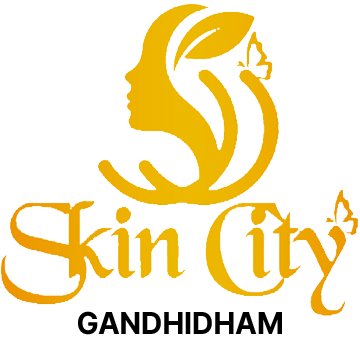Acne is a common skin condition that can affect people of all ages, leaving behind not only physical blemishes but also emotional scars. Even after acne breakouts have cleared, the aftermath may include various types of acne scars, each requiring a tailored approach for effective treatment. At Skin-City Gandhidham, we understand the impact acne scars can have on your confidence and well-being. In this guide, we will delve into the different types of acne scars, including ice pick, rolling, and boxcar scars, and explore the appropriate treatment options available.
Understanding Acne Scars
Acne scars form as a result of the body’s natural healing process when severe acne lesions damage the skin’s collagen and elastin fibers. The type of scar that develops can vary depending on factors such as the depth and severity of the acne lesion and individual skin characteristics.
- Ice Pick Scars:

- Ice pick scars are deep and narrow, resembling small pits or punctures in the skin. They are often the result of deep, inflammatory acne. These scars can be challenging to treat due to their depth.
- Rolling Scars:
- Rolling scars create a wavy or undulating appearance on the skin’s surface. They occur when fibrous bands of tissue form between the skin and deeper subcutaneous tissue.
- Boxcar Scars:
- Boxcar scars are characterized by their well-defined edges and resemble shallow depressions or craters in the skin. They often result from inflammatory acne.
Treatment Options for Acne Scars
Effective treatment of acne scars depends on their type, depth, and the individual’s skin type. At Skin-City Gandhidham, we offer a range of treatments to address different types of acne scars:
- Microneedling:

- Microneedling involves the use of fine needles to create controlled micro-injuries in the skin, stimulating collagen production and improving the appearance of scars, including rolling and boxcar scars.
- Chemical Peels:
- Image: Chemical peel application.
- Chemical peels involve the application of a chemical solution to the skin, which exfoliates the top layer and encourages new skin cell growth. Superficial peels are effective for mild acne scars.
- Laser Resurfacing:
- Image: Laser resurfacing equipment.
- Laser resurfacing treatments, such as fractional laser therapy, target specific areas of the skin to promote collagen production and improve the texture of the skin. They are effective for various types of acne scars.
- Dermal Fillers:
- Image: Syringe with dermal filler.
- Dermal fillers, such as hyaluronic acid, can be injected into certain types of acne scars, like rolling scars, to raise the depressed areas and create a smoother skin surface.
- Subcision:
- Image: Illustration of subcision procedure.
- Subcision involves the use of a needle to break up the fibrous bands beneath rolling scars, allowing the skin to lift and become smoother.
Personalized Treatment Plans
It’s important to note that not all acne scars are the same, and what works for one individual may not be suitable for another. At Skin-City Gandhidham, our experienced dermatologists assess each patient’s unique skin and scar type to create personalized treatment plans. During your consultation, we will discuss your goals, budget, and expected outcomes to determine the most effective approach to treating your acne scars.
Conclusion
Acne scars can be a lasting reminder of past skin struggles, but they don’t have to define your appearance. With advancements in dermatology and a tailored treatment plan from Skin-City Gandhidham, you can regain confidence in your skin’s health and appearance. We are committed to helping you achieve smoother, more radiant skin by addressing your specific acne scar concerns.


